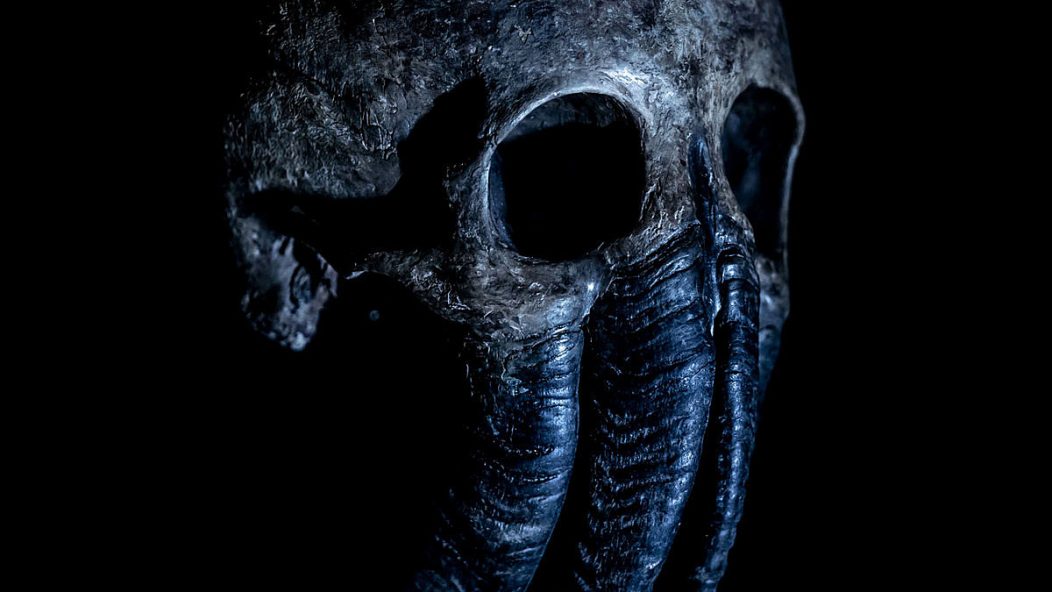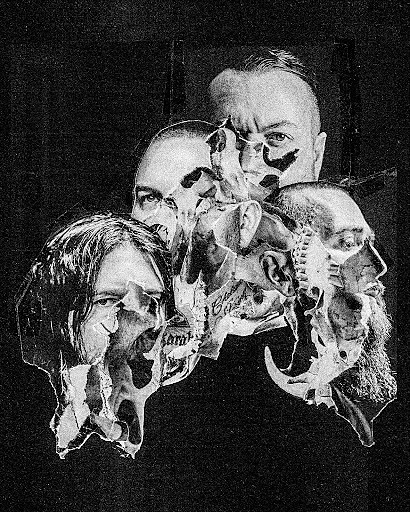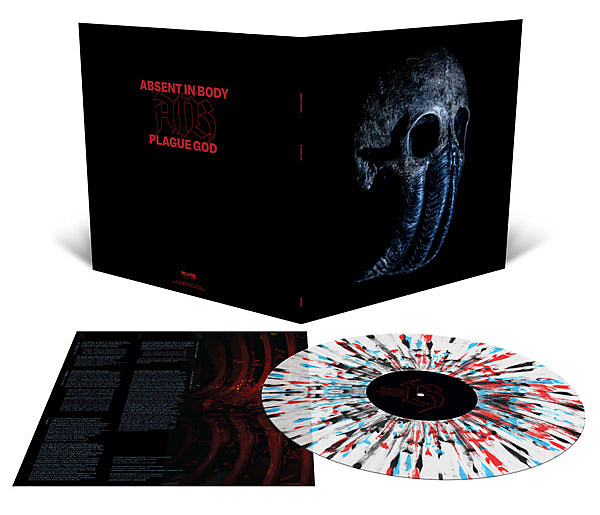
Absent In Body: Members of Amenra, Neurosis Call Forth the Plague God (Interview with Colin H. van Eeckhout)
Like a tank lurching forward on EBM treads, Absent In Body‘s debut album Plague God is a post-metal juggernaut. Its five songs cover sonically dense territory. From stretches of post-apocalyptic aggression to mechanical clanks and howls, Absent In Body leverages its members’ collective skillset in service of a record that stands tall on its own.
The lede here, arguably, is Absent In Body’s lineup. The group has its origins in a planned split between Amenra‘s Mathieu Vandekerckhove and Neurosis‘s Scott Kelly. While touring, they recruited Amenra frontman Colin H. van Eeckhout to handle vocals. The then-three piece created a single, punishing track together while tinkering with new material. In the meantime, they recruited Iggor Cavalera, formerly of Brazilian legends Sepultura.
…

…
In other words, Absent In Body has quite the pedigree. Whether or not one wants to think of the above as a “supergroup” or not, it’s inarguable that a band like this coming together is going to raise eyebrows and expectations. Plague God also comes less than a year after Vandekerckhove and van Eeckhout released De Doorn, so it would be fair to wonder about the timeframe for Absent In Body—add this to the endless file of metal bands with novel-length Metal Archives pages that prompt the question, “how did they manage that?”
However, Plague God lives up to its billing. Striding forward to the thundering of Cavalera’s drums, Absent In Body connects surfaces of churning metal instrumentation together with ligaments of EBM-derived noisescapes. Vandekerckhove is responsible for most of these touches, using spare time to construct atmospherics until the band could gather as a four-piece to record.
Plague God took time to record, and not just because its members were often separated by an ocean. The songwriting process was deliberate. Adherents to the Church of Ra will also be struck by van Eeckhout’s vocal approach. Only seldom does he shift into more familiar shrieks, croons, and spoken-word invocations—instead, for much of the record, his voice is a wounded braying through a film of static. Even for a musically versatile artist, van Eeckhout’s ability to dig deeper for further range is impressive.
From a songwriting perspective, Plague God‘s five tracks may share pacing but otherwise cover differing territory, offering a variety of textures across the record’s 36 minutes. “Sarin” is pure industrial malevolence. Van Eeckhout’s growl seems to emanate from behind an assembly line, whirrs and hisses panning around as he chants. Meanwhile, “The Acres/The Ache” takes a meditative turn in its back half that begins to verge into outright post-rock.
Such are the rewards of a project by true veterans with a history of good intuition. When supergroups or side projects fail, it is usually because they fail to transcend their creators. Absent In Body may contain identifiable shards of Neurosis or Amenra, but the overall machine is something new, something glinting and deadly. Plague God is a fitting accompaniment to life in a world that feels ever closer to dystopia.
Curious about the group’s origins and the process of creating this debut record, I reached out to bassist and vocalist Colin H. van Eeckhout via Zoom. The following interview has been lightly edited for length and clarity.
…
…
Absent In Body has quite a lineup. It sounds like this started with Mathieu and Scott—how did this project coalesce, and what brought you and Igor into the fold?
There was a plan of doing a split release around 2016 where Scott and Mathieu were going to each do a side of a split album on a small label here in Belgium. I was on tour with Scott around that time with our solo project, and Mathieu came to our show in France, and that was where Scott said, “maybe we should do something together.”… Eventually, they asked me if I wanted to do vocals on it. Scott didn’t really feel like being the so-called frontman—he did come up with the name, though—[and] after that release came out, very soon there was a plan for continuing [Absent In Body] since we thought we had something good going.
So, Mathieu started writing again and pretty much wrote the blueprint of the album. He programmed the electronics on his laptop while we were on tour with Amenra. I heard a lot of it and was very stoked about the songs he was making…. Every time Scott was on tour in Europe, mostly after his solo tours, there was some time scheduled to get into the studio together. As we went along, we met Igor. He spends a lot of time in Ghent, where I live. His wife is on a label from our city here. We always said “hey, we should do something together,” and Absent In Body seemed to be the right project for that. We were curious to see what his addition to it would bring—in theory, there was already an electronic rhythm section, but we wanted [Plague God] to have an organic, ancient, tribal-esque feel to it as well, and he was the perfect man for that. He lives in London and jumped on a train to record. It was recorded in Amenra’s bass player’s [Tim de Gieter’s] studio.
What difference did it make recording this live in the studio?
It was important for us to record in the same room and not just send files hence and forth. It feels more like a communal thing because there’s just more communication around ideas. You kind of inspire each other, and it always has a very different dynamic than file-sharing.
Your 2017 release together was soaked in reverb and industrial ambience, and that’s definitely a part of Plague God. It sounds like some of this is drawn from EBM. What underpins this new record’s sound?
In Belgium, we were kind of the cradle, or involved, when the industrial and EBM style was introduced with bands like Front 242. That’s what definitely inspired Mathieu. He wanted to explore that area, where he would program the drums, and we’d have a lot more straightforward drumming. There’s not a lot of shifts in dynamics [in the rhythm section], so that made all the weight fall on the guitar and vocals… Anyway, it was definitely Front 242, Ministry, early Godflesh, early Nine Inch Nails, things like that that he was listening to a lot at those times. Also, the fact that we were spending a lot of time on tour, and it was doable on a laptop. He said he just sat at the window of the tour bus, looking outside, and just let the different landscapes inspire him. That made sure that some songs have a weird and explicit shift in their structure. He said, “I started off in the woods and ended in a desert, and it kinda shifted me toward different ways of thinking.”
To focus just on your role for the moment, any Amenra fan is likely to hear a big difference in your vocal delivery. You also play bass here. Was there a learning curve? How’d you develop your sound for Absent In Body and make it distinct from Amenra?
It took me ages… For me, the bass was the easy part, and the lyrics were already written. The way I write is I listen to the instrumental music a zillion times and then the vocals start popping into my head. This time, I heard a low voice. Naturally, I don’t have a low voice, I have a kind of high-pitched squeal going [for Amenra]. I hesitated, and I uttered the idea that maybe we need a different singer for this project, like “maybe I’m not the guy—I feel like it needs to sound like a lower voice than what we have.”
And then, Dwid of Integrity, who also lives in our city, and Tim, who recorded the album, from Amenra, said “it has to be inside you somewhere.” We took the time in the studio, and we just went for it. They kept pushing me to do it myself. Eventually, it worked out. Interestingly, in my opinion. I was kind of scared to let the others [of Absent In Body] hear what I was up to because they probably thought it would sound different, but it all made sense. It needed to be that voice to tell that story… Maybe that was my attempt to pull the two bands I am in [apart from] each other. We already have Mathieu, and then you would have that distinct voice that would pull us too much toward that band we were already in. We had to make a shift to highlight the fact that we’re telling a different story. It took me ages to do, and I was actually the last one to record during the lockdowns.
“In Spirit in Spite” has a spoken-word passage reminiscent of De Doorn. What was the inspiration there? Was that from that same generative process as De Doorn?
Yeah, I was pretty much in that [process of creating De Doorn], so that’s why that seeped in there, as well. When I was doing [“In Spirit in Spite”] and doing that part in English, I think I realized I got that from Henry Rollins a Tool song somewhere—on Undertow he does a guest thing [on “Bottom”]. I think I got inspiration from his decisions at some point.
Just from that title, this sounds like an album influenced by the world’s chaos these past two years. What changed between 2017 and now based on what’s happened in the world?
Now, [compared to 2017,] we really had a goal, and that goal was to create a beast. We all agreed it had to be ferocious, in a way, because that’s how we feel the story of contemporary living should be, in a way. Also, in the writing of the lyrics, I realized that it was very direct, and very provoking, and rather aggressive in comparison to what I normally write because it fit the idea of the album. It’s definitely inspired by all the mass information that is tossed over our heads day in, day out these days. It’s hard as an empathetic organism, because we’re still animals at our core, to handle all that information. Decades ago, the information was what was happening in your village. Now you have the weight of the world everyday in your hand, and we do nothing but go through it for hours and hours a day. It makes it hard to handle all that. In a way, you’re torn between wanting to help and make everything better and trying to forget it; otherwise, you can’t live a happy life anymore. That’s the whole thing with that album—it’s the mixture between mechanical, repetitive, contemporary industrial-ish sounds, and also the ancient, tribal-esque feel that Igor added with his drumming.
Was the title a direct result of the Pandemic?
Oh yeah, definitely. But it made sense in the whole context—ecologically, in terms of human relations and the polarization between people, humanity slowly eating each other—all of that together made it make sense.
Where do you find time for such an ambitious project? Has there ever been a point where you felt like Absent In Body competed for your attention?
It’s been spread out since 2017, when the first notes were written, and we finalized [Plague God] in 2021, so we really took the time for it. We didn’t force it into our agendas; we just waited until the opportunity came. There was no stress about it. There was no pressure or anything. We just wanted to go ahead until we had something we felt confident and proud about. It’s also attractive, I think, to do those other projects because of the freedom you have in them. There are no expectations, at first, when we write it. When it gets released, and people start talking about “supergroup,” then the expectations are coming. But when we were writing, there are… no parameters to keep in [mind], no fans to disappoint, and that album didn’t need to be better than our former album. That’s really attractive to people who have that pressure with their other projects. We all loved working on it because it went so easily.
Will you all be supporting this album with any live dates?
When the agendas allow it, yeah. At the beginning, we just wanted to build an album that stood its ground, but then as we were recording, we [spoke] about the idea of at least doing one show, or a couple of shows, to drop the bomb as it should be dropped, you know? But it’s definitely not the priority. Like I said, we recorded whenever it fit our agenda, but if you want to pay a live show, you really have to get together and rehearse if you want to get it done decently. That’s where it’s gonna be difficult. But we’ll see—we don’t say “no,” but we won’t say when, either.
Clearly you all are on the same wavelength with Absent In Body, so what’s next for the group? Have you been writing for Absent In Body, or is that something that’s just going to happen when it happens?
We’re gonna see about a follow-up thing at some point. We still have the older release that we want to re-release. We’re already busy remixing things, chopping them up a little bit more, making them a bit more experimental. We’re playing around. I think the time now is to focus on the other bands we have. We’ll take our time, but there’s a good chance there’ll be another chapter to this story.
…
Plague God releases March 25th on Relapse Records. Grab a copy on limited splatter vinyl.











